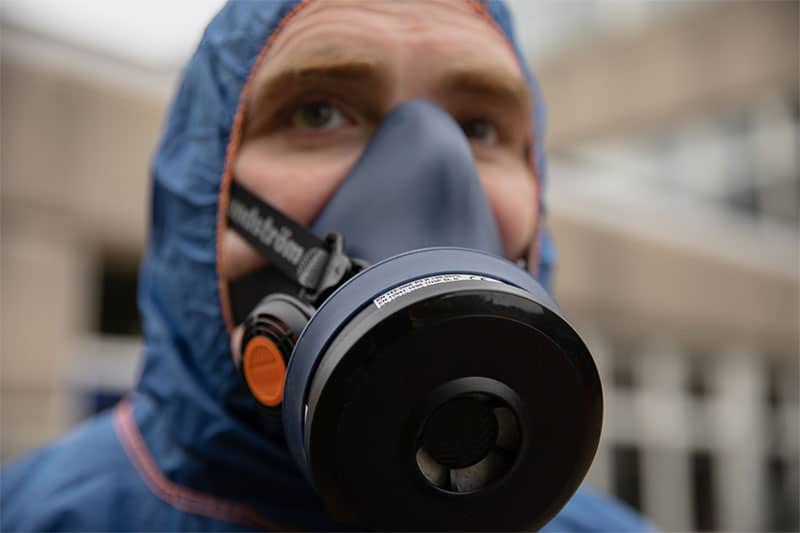Is asbestos training a legal requirement?
While it has not been legal to import or use asbestos in the UK since 1999, the fact that this naturally occurring fibrous silicate mineral is still contained within many public, residential, and commercial buildings around the country, means careful and safe management of the substance continues to be needed in the 2020s. Asbestos training plays a central role in ensuring such effective management.
Asbestos was first commercially mined in the middle of the 19th century, and went on to be especially heavily used in UK industries such as shipbuilding and construction, over much of the following century. Such products as sprayed coatings, textured coatings, asbestos insulating board (AIB), roofing felt, and rope seals and gaskets, were made using asbestos, which was seen as a “wonder material” due to qualities like its affordability, attainability, and physical strength.
As the 20th century progressed, however, it became increasingly known among the public that inhalation or ingestion of asbestos fibres could present an elevated risk of developing certain potentially fatal diseases, such as mesothelioma and asbestos-related lung cancer. The awareness of these risks has led to the much more stringent regulatory requirements that surround asbestos management in the UK today.
A key plank of UK asbestos regulation is the need for an appropriate level of asbestos training to be provided to people who may intend to work on asbestos-containing materials (ACMs), or who don’t intend to work on asbestos but could be at risk of coming into contact with it.
Here at Oracle Solutions, we realise that a lot of confusion can arise on the question of whether asbestos training is legally required. So, below, we have sought to provide greater clarity on this subject.
What are asbestos regulations?
The key overarching piece of asbestos-related legislation in the UK today, is the Control of Asbestos Regulations 2012 (also sometimes referred to as “CAR 2012”).
When it took effect in April 2012, CAR 2012 superseded the previous Control of Asbestos Regulations 2006. CAR 2006, in turn, had brought together various asbestos-related pieces of legislation, including the Control of Asbestos at Work Regulations 2002, the Asbestos (Licensing) Regulations 1983, and the Asbestos (Prohibitions) Regulations 1992.
With regard to the current asbestos regulations, it is Regulation 10 of CAR 2012 that is particularly explicit in setting out the need for asbestos-related information, instruction and training, which employers must provide at an adequate level for employees at risk of exposure to asbestos. It is expected that employers will offer such training regularly, in addition to adapting it in line with any changes to the work environment or practices.
What are the legal requirements for asbestos training?
Regulation 10 of CAR 2012 states that employers must ensure their employees are given adequate information, instruction, and training, in situations where the given employee could be potentially exposed to asbestos, or if the employee will be supervising other workers who could be at risk of such exposure.
If asbestos information, instruction, and training will indeed to be needed, CAR 2012 states that it must make the trained employee aware of the following:
- The properties of asbestos and its effects on health, including its interaction with smoking;
- The types of products or materials that are likely to contain asbestos;
- The operations that could bring about exposure to asbestos, and the importance of preventative measures in order to minimise exposure;
- Safe work practices, control measures, and protective equipment;
- The purpose, choice, limitations, proper use, and maintenance of respiratory protective equipment;
- Emergency procedures;
- Hygiene requirements;
- Decontamination procedures;
- Waste handling procedures;
- Medical examination requirements; and
- The control limit and the need for air monitoring.
Regulation 10 goes on to state that such information, instruction, and training must be provided “in a manner appropriate to the nature and degree of exposure identified by the risk assessment”.
Indeed, there is not just one level of information, instruction, and training in relation to asbestos in the UK. There are, in fact, three main levels:
- Asbestos awareness
- Non-licensable work with asbestos, including Notifiable Non-licensed Work (NNLW)
- Licensable work with asbestos
The first of those, asbestos awareness training, is the lowest form of asbestos training; it is aimed at workers and supervisors who do not intend to work directly on ACMs or to disturb such materials, but who nonetheless could be at risk of causing asbestos disturbance over the course of their day-to-day work. It is, then, directed at people who wish to avoid causing such asbestos disturbance.
As for if it is expected that the worker in question will be disturbing asbestos – for example, because they will be removing asbestos from the site – it is training in one of the other two categories that they will require.
The term “licensed” in relation to asbestos work, refers to work that requires a licence from the UK Health and Safety Executive (HSE). Particular types of asbestos work being licensed indicates that these are perceived to be higher-risk forms of asbestos work than tasks for which a HSE licence is not required.
What are the consequences of non-compliance?
If an incident of asbestos exposure occurs on a site for which you are responsible, and it is found that you did not provide adequate asbestos training to your workers, you may be at risk of being hit with massive fines. Indeed, serious breaches of the UK asbestos regulations can lead to an unlimited fine and/or a prison sentence of up to two years.
The other major risk that arises where suitable asbestos training has not been given, is – of course – the health and safety one.
If workers have not been provided with information and instruction that will enable them to avoid disturbing asbestos in the first place, or if they do not know what all the requirements are for keeping safe while working on ACMs, they could be at risk of causing asbestos fibres to be released into the air. This could be rapidly followed by them breathing in or ingesting the substance, or someone else nearby doing so, with all the associated health risks.
With individual asbestos fibres being barely discernible to the naked eye, even if there were not serious legal consequences for a failure to provide asbestos training, workers would not be able to depend on simply spotting asbestos risks by sight alone. They need to know what all the accepted “best practices” are for identifying, avoiding, and/or managing asbestos in a safe and responsible way, which is exactly what the right level of asbestos training will help make them aware of.
Who is required to receive training?
Licensed asbestos work can only be carried out by competent workers and managers who have been provided with suitable information, instruction, and training in relation to this type of work. Such workers will need to use appropriate respiratory and other protective equipment, and of course, they will need to hold a licence from the HSE as well.
However, as we touched on above, there is a much broader range of workers for whom asbestos training could be required: those who do not intend to work on asbestos, but who could still come into contact with ACMs over the course of their normal work.
Listed below are examples of such workers, who could benefit greatly from receiving asbestos awareness training before they carry out work that could disturb the fabric of a building in which the harmful mineral is present:
- Construction workers
- Demolition workers
- Plumbers
- Joiners
- Electricians
- General maintenance workers
- Roofers
- Painters and decorators
- Plasterers
- Gas fitters
- Heating and ventilation engineers
- Installers of fire alarms and burglar alarms
It is important to emphasise that the above is not an exhaustive list. By carrying out an appropriate risk assessment, taking into account factors such as whether the given premises was constructed or renovated prior to the year 2000 when asbestos was still in widespread use in the UK, you can make informed decisions on the asbestos training that your own personnel may require.
How do you choose the right asbestos training provider?
While there are certainly many companies out there that advertise themselves as offering high-quality and suitable asbestos training, it may not be obvious to you at first glance whether this is the case with a specific training provider that you are considering.
Fortunately, our team here at Oracle Solutions has recently written extensively on this subject. So, please feel free to click through to learn more about some of the factors that will help you whittle down the training providers you are attempting to decide between.
Those factors could encompass:
- The specific type of asbestos training that you require, of the three main levels described above – asbestos awareness, non-licensed work, and licensed work
- The accreditations and/or certifications that a given asbestos training provider has, such as professional membership of the United Kingdom Asbestos Training Association (UKATA)
- The course content and curriculum offered by a particular provider, and how well-matched those elements are to your requirements
- The modes of delivery that are available for such training, which could include in-person, online, and/or a combination of these formats
- The reviews and testimonials that previous participants in a given provider’s asbestos courses have provided; checking this can involve looking online, as well as asking industry professionals or colleagues for their own recommendations and/or experiences of certain course providers
- The support resources, materials, and post-training assistance that the given course provider makes available. There might even be online forums or helplines that you can take advantage of, to help embed the lessons learned through the company’s asbestos training.
How can you keep up with the latest changes to regulations?
Hopefully, the fact that you are reading this article will indicate you are sufficiently vigilant about your asbestos obligations to know the importance of keeping up to date with the regulatory picture around asbestos management as it may evolve over time (and ensuring the same for your workers).
There are various ways in which you might do this, such as keeping informed via resources such as the HSE’s website on asbestos, and our own online Learning Centre here at Oracle Solutions, combined with communicating relevant changes to your workers.
However, regular updates in the training that you provide to your personnel can also be crucial to ensuring their knowledge stays fresh and up to date.
Ensuring an adequate asbestos awareness update is provided at least every 12 months to your workers – with this potentially taking the form of a dedicated asbestos refresher course, such as those we provide here at Oracle Solutions – can help protect you from the legal and health and safety implications that could otherwise arise if workers’ knowledge is not up to date.
Conclusion: Is asbestos training a legal requirement?
In summary, then, asbestos training is very much a legal requirement for certain workers and in certain contexts, as is stipulated by Regulation 10 of the Control of Asbestos Regulations 2012.
By familiarising yourself with these contexts and obligations and how they relate to activities you intend to have carried out on your premises, you can take the decisions that will help keep you on the right side of the UK’s stringent asbestos legal framework.
You should always bear closely in mind, too, that the provision of adequate asbestos training for your workers will always be of the utmost importance for reasons of both legality and health and safety. So, it is not only the current legal picture that should guide your thinking.
To find out more about the services that Oracle Solutions can provide in relation to asbestos training, management, and more, please don’t hesitate to call us today. You can also email us to request your fast and free quote.

Written by Brendan Coleman
Brendan Coleman, with decades of experience in the asbestos industry, is a dedicated Quality Manager. Certified as a surveyor and analyst, he is adept in operations and quality management with a keen focus on HSE compliance. His expertise is pivotal in maintaining high safety and efficiency standards. Brendan ensures our UKAS accreditation requirements are consistently met and exceeded, upholding stringent standards in asbestos remediation. His commitment to enhancing quality and customer satisfaction makes him an essential advisor in asbestos management.

